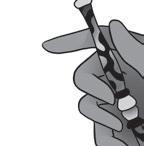

Much Ado About Nothing
BOOKS IN THE STAGED COLLECTION THE COMEDIES
As You Like It
A Midsummer Night’s Dream
Much Ado About Nothing
THE TRAGEDIES
Hamlet Macbeth
Romeo and Juliet

PENGUIN BOOKS
UK | USA | Canada | Ireland | Australia
India | New Zealand | South Africa
Penguin Books is part of the Penguin Random House group of companies whose addresses can be found at global.penguinrandomhouse.com
www.penguin.co.uk
www.puffin.co.uk
www.ladybird.co.uk
First published in the UK by Penguin Books 2024
001
This edition copyright © Penguin Books, 2024 Foreword copyright © Holly Bourne, 2024
Endmatter copyright © Penguin Books, 2024
Back cover flowers copyright © Adobe Stock, 2024
Illustrations by Lucie Corbasson-Guévenoux (Lucie Louxor), 2024
The moral right of the authors and illustrator has been asserted
Printed and bound in Great Britain by Clays Ltd, Elcograf S.p.A.
The authorized representative in the EEA is Penguin Random House Ireland, Morrison Chambers, 32 Nassau Street, Dublin d02 yh68
A CIP catalogue record for this book is available from the British Library
isbn: 978–0–241–68205–0
All correspondence to:
Penguin Books
Penguin Random House Children’s
One Embassy Gardens, 8 Viaduct Gardens, London sw11 7bw
Penguin Random House is committed to a sustainable future for our business, our readers and our planet. is book is made from Forest Stewardship Council® certified paper.
FOREWORD
BY HOLLY BOURNEI’m not sure I’m allowed to say this in the foreword to one of his actual plays, but I’ve never been the biggest fan of Shakespeare. Maybe I got the wrong plays to study at school? They all seemed to be about historical blokes murdering each other to be king, which made no sense to me as being king seemed to be a daily struggle not to get murdered. Or I’d have to study the ‘comedies’ – where my English teacher painstakingly explained each joke and promised my class it would’ve been hilarious in Elizabethan times. None of his work seemed particularly relevant to my life, or my interests – but, then again, I hadn’t yet discovered the utter perfection of Much Ado About Nothing.
I initially came across this play via the film version. I had a huge teenage crush on Keanu Reeves, and heard he played the villain in this, while wandering about topless, covered in oil and
wearing leather trousers. I was all set to fast forward through the opening credits to the leather trousers, my finger hovering over the button, when I heard the character Beatrice recite the poem ‘Sigh no more, ladies, sigh no more.’ I turned up the volume and listened. Then I rewound it and played it again. It was a song basically saying ‘men are trash’ but in gorgeous Shakespearean prose, and I became an instant convert.
The week before, my best friend had been cheated on by her first boyfriend, and I’d diligently organised an ‘anti-men’ sleepover. We’d all ended up making ourselves ‘Spinster Club’ membership cards (this sleepover would later inspire my Spinster Club book series), and Beatrice and her poem would’ve fitted right in. For the first time, the Bard became relevant to my life, and I started to understand why he was so beloved.
I came for Keanu, but I stayed for Beatrice. I don’t think there’s been a better female lead character in all life, not just Shakespeare plays. She’s a feminist force – refusing to marry because she hasn’t met her equal and doesn’t want to exchange her freedom for a controlling husband. She also calls out Claudio for falsely accusing her beloved cousin, Hero, of cheating on him. Plus, she’s super intelligent and super funny, but vulnerable and human underneath her sharp tongue and wit.
It’s been said a thousand times before, but Much Ado About
Nothing is the original romantic comedy. The love affair between Beatrice and Benedick is a pitch-perfect example of the enemiesto-lovers trope, except, back then, it wasn’t a trope. Just as Shakespeare may have invented many words we still use today (my favourite being ‘eyeball’), almost all of the romcom’s generic conventions originated in this play. I’ll always say there’s nothing better than watching or reading the dialogue of two people who really fancy each other, and the banter between Beatrice and Benedick is effortlessly joyful. There’s something so wonderfully . . . British, too, about the way they take the piss out of each other. I’m also a huge fan of characters swearing off love forever only to have their heart swayed by the end.
Finally, be still my beating heart for the trope of ‘fake’ situations revealing very true feelings. Romcoms thrive on misdirection, misunderstanding, overhearing things you shouldn’t, and everything being solvable if only the love interests would have a conversation but refusing to do so before the happily-ever-after. Shakespeare created these tropes and executed them perfectly, and it therefore makes sense that Much Ado About Nothing has been made and remade hundreds of times, in various forms, set in various time periods, and has always been adored by swooning audiences. Although all adaptations should involve Keanu in leather trousers, in my scholarly opinion.
Much Ado About Nothing
THE CHARACTERS IN THE PLAY
don pedro, Prince of Arragon
benedick, a gentleman from Padua, companion of Don Pedro
claudio, a young lord from Florence, companion of Don Pedro
don john, brother of Don Pedro
borachio
conrade
followers of Don John
leonato, Governor of Messina
hero, Leonato’s daughter
beatrice, Leonato’s orphaned niece
margaret
ursula
attendants on Hero
antonio, elderly brother of Leonato
balthasar, a singer
friar
francis, a priest
dogberry, Master Constable of Messina
verges, Dogberry’s colleague
THE CHARACTERS IN THE PLAY
first watchman
second watchman
sexton messengers
boy, servant to Benedick
lord
Antonio’s son
Attendants and Musicians in Leonato’s household









ACT I
SCENE I
BEFORE LEONATO’S HOUSE
Enter Leonato, Hero, Beatrice and a Messenger
l eonato
I learn in this letter that Don Pedro of Aragon comes this night to Messina.
m essenger
He is very near by this: he was not three leagues off when I left him.
l eonato
How many gentlemen have you lost in this action?
m essenger
But few of any sort, and none of name.
l eonato
A victory is twice itself when the achiever brings home full numbers. I find here that Don Pedro hath bestowed much honour on a young Florentine called Claudio.
m essenger
Much deserved on his part and equally remembered by Don Pedro. He hath borne himself beyond the promise of his age, doing in the figure of a lamb the feats of a lion. He hath indeed better bettered expectation than you must expect of me to tell you how.
l eonato
He hath an uncle here in Messina will be very much glad of it.
m essenger
I have already delivered him letters, and there appears much joy in him, even so much that joy could not show itself modest enough without a badge of bitterness.
l eonato
Did he break out into tears?
m essenger
In great measure.
l eonato
A kind overflow of kindness: there are no faces truer than those that are so washed. How much better is it to weep at joy than to joy at weeping!
b eatrice
I pray you, is Signior Mountanto returned from the wars or no?
m essenger
I know none of that name, lady. There was none such in the army of any sort.
l eonato
What is he that you ask for, niece?
h ero
My cousin means Signior Benedick of Padua.
m essenger
O, he’s returned, and as pleasant as ever he was.
b eatrice
He set up his bills here in Messina and challenged Cupid at the flight, and my uncle’s fool, reading the challenge, subscribed for Cupid and challenged him at the bird- bolt.
I pray you, how many hath he killed and eaten in these wars? But how many hath he killed? For indeed I promised to eat all of his killing.
MUCH ADO ABOUT NOTHING
l eonato
Faith, niece, you tax Signior Benedick too much. But he’ll be meet with you, I doubt it not.
m essenger
He hath done good service, lady, in these wars.
b eatrice
You had musty victual, and he hath holp to eat it. He is a very valiant trencherman; he hath an excellent stomach.
m essenger
And a good soldier too, lady.
b eatrice
And a good soldier to a lady. But what is he to a lord?
m essenger
A lord to a lord, a man to a man, stuffed with all honourable virtues.
b eatrice
It is so, indeed. He is no less than a stuffed man. But for the stuffing – well, we are all mortal.
l eonato
You must not, sir, mistake my niece. There is a kind of merry war betwixt Signior Benedick and her. They never meet but there’s a skirmish of wit between them.
b eatrice
Alas, he gets nothing by that. In our last conflict four of his five wits went halting off, and now is the whole man governed with one. So that if he have wit enough to keep himself warm, let him bear it for a difference between himself and his horse, for it is all the wealth that he hath left, to be known a reasonable creature. Who is his companion now? He hath every month a new sworn brother.
m essenger
Is’t possible?
b eatrice
Very easily possible. He wears his faith but as the fashion of his hat; it ever changes with the next block.
m essenger
I see, lady, the gentleman is not in your books.
b eatrice
No. An he were, I would burn my study. But, I pray you, who is his companion? Is there no young squarer now that will make a voyage with him to the devil?
m essenger
He is most in the company of the right noble Claudio.
